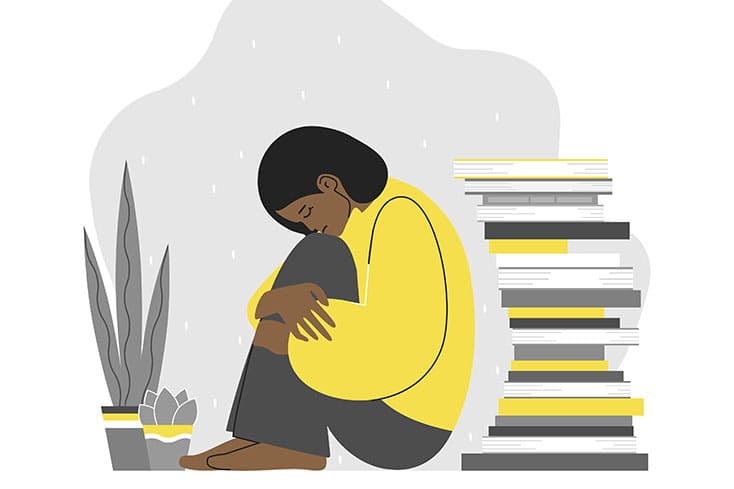September 13, 2021
By Ginger Abbot

In 2018, more than 63% of college students reported experiencing overwhelming anxiety during their enrollment and nearly 42% reported feeling so depressed that they had trouble functioning at some point during the last 12 months. Some of these students may not have battled a mental health challenge before attending college and might not know how to deal with depression in this new environment.
Meanwhile, friends, roommates and classmates often have difficulty recognizing symptoms of depression in students. However, if these peers understand the warning signs to look for, they will be empowered to check in with the college students in their lives who may be struggling sooner and assist them in getting help. Better yet, a familiarity with the warning signs could help curb the thousands of preventable deaths by suicide each year.
So, if you want to be an attentive friend or support system for someone dealing with depression — and help your fellow students — keep an eye out for the following warning signs so you can begin a conversation with anyone you may be concerned about.
One of the first warning signs of depression is expressing or showing negative feelings or emotions. For instance, someone might reveal they’re feeling sad, anxious or numb, or perhaps they’ll share that they’re dealing with more stress than usual. Others may not express what they are feeling, but it may be obvious that they are feeling more anger, frustration or sadness than in the past. For example, they may have a short temper, exhibit less engagement in conversation and normal activities or experience sudden outbursts.
Often, people with depression can’t identify why they’re feeling sad or when they began to experience these emotions. It’s also possible that if you ask more questions about “why” or “when,” they may shut down and become avoidant or unresponsive.
What to say:
Let’s say you’re concerned about your roommate. It can be helpful to avoid asking too many questions, remind them they’re not alone, validate their feelings, and prepare to listen if they do open up.
If you pay close attention, you might notice irregular eating habits in your friend or roommate. Do they skip meals regularly? Do they eat whenever they are stressed? Both undereating and overeating are warning signs of depression.
Depression also affects people’s sleep schedules. For instance, if your roommate is experiencing depressive symptoms, they may repeatedly sleep for more than 10 hours a night while someone else with depression might struggle with insomnia.
What to say:
It’s best not to comment on someone’s eating or sleeping habits, but rather inquire about the underlying reasons they might be engaging in that behavior.
Hobbies are a great way to explore your interests and relieve stress while you’re in college. However, students struggling with depression might not care to engage in activities they used to enjoy. They might also avoid social situations, including time with friends.
This general lack of interest is a telling sign of depression and can often perpetuate more feelings of loneliness, isolation and sadness.
What to say:
If your roommate rarely leaves the dorm, offer to do something — or nothing — together.
Depression doesn’t always come from specific circumstances, and people from all backgrounds and situations can experience it. Unfortunately, this can cause guilty feelings in students who have “had it good” and still struggle with depression.
As a result, these feelings can cause students to spiral because they perceive themselves as a burden or as “incomplete,” which can make symptoms even worse. Therefore, it’s essential to watch out for negative self-talk and twinges of guilt.
What to say:
Discourage negative self-talk, validate your roommate’s feelings and remind them of their worth.
Depression can cause unexplainable pain, chronic illness, and discomfort independent of any injury. Muscle aches and joint pain in the chest, back, neck and shoulders are all potential warning signs.
Of course, these symptoms are easy to spot if they’re severe and cause great discomfort. However, if your roommate is avoiding you — or is just really good at hiding their true feelings — you might go weeks without noticing their aches and pains.
What to say:
Ask about potential injuries or underlying conditions before jumping to conclusions. Then, work together to find ways to alleviate discomfort.
If you notice any of these warning signs of depression in college students, it’s crucial that you reach out and encourage them to seek help. Your empathy and concern could save someone’s life, so the sooner you speak up, the better.
Ginger Abbot is a college and career writer with a special interest in helping students care for their wellness, mental health and goals. Read more of her work on Classrooms, where she serves as editor.
We’re always accepting submissions to the NAMI Blog! We feature the latest research, stories of recovery, ways to end stigma and strategies for living well with mental illness. Most importantly: We feature your voices.
LEARN MORENAMI HelpLine is available M-F, 10 a.m. – 10 p.m. ET. Call 800-950-6264,
text “helpline” to 62640, or chat online. In a crisis, call or text 988 (24/7).